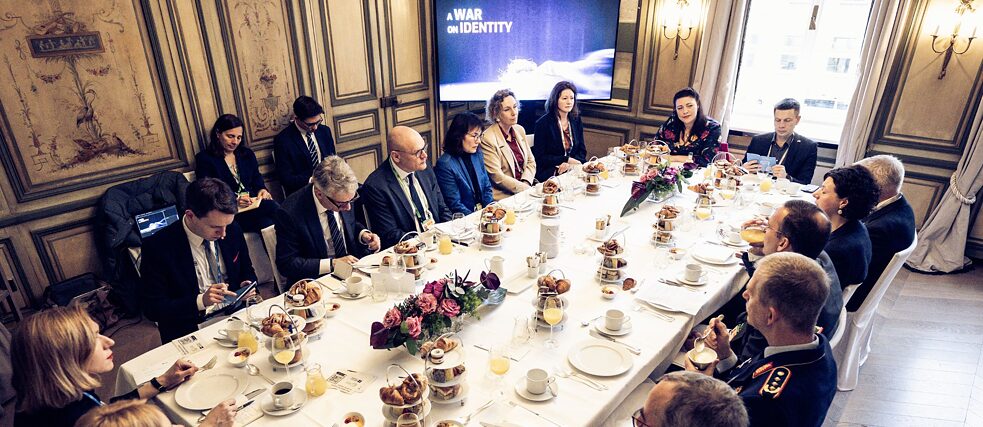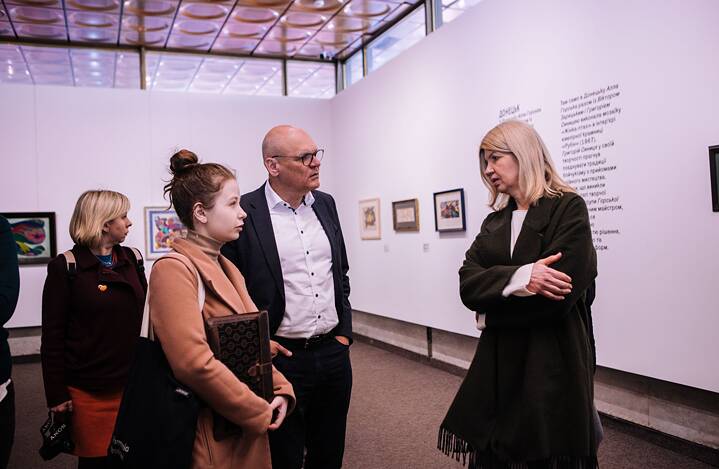Editorial of the Annual Report
Culture and security

Culture and education shape how societies see themselves. They create free spaces and can strengthen and support social cohesion. In international politics, they thus have a role to play in security policy.
By Johannes Ebert
Munich, February 2024. Accompanied by Olesia Ostrovska-Liuta, the director general of the Ukrainian cultural institution Mystetskyi Arsenal, I pass through the police checks early in the morning on my way into the Hotel Bayerischer Hof. The first day of the Munich Security Conference. We meet Scott McDonald, chief executive of the British Council. Together we’re organising a breakfast as a side event at the conference. The topic: “A War on Identity: How to Build Post-War Society in Ukraine.” Scott and I are nervous about whether everyone will turn up at this early hour. But at 7:30 a.m., the twenty guests are there right on time: elected members of the Ukrainian and the European parliaments and representatives of the Munich Security Conference, the Foreign Office and the Bundeswehr, as well as of supporting organisations. Alicia Kearns, the chair of the Foreign Affairs Committee of the British House of Commons, is moderating. The topic strikes a nerve at this time.
The Goethe-Institut at the Munich Security Conference? In recent years, Goethe-Institutes have increasingly been reporting that rifts in society are deepening, that illiberalism is on the rise, and that new centres of power are emerging which call into question values of freedom and tolerance. Simultaneously, populist currents and their political representatives are inciting dangerous nationalist – one could say regressive – divisions. There is a pull in an entirely different direction, meanwhile, from emancipatory movements that call for a reckoning with colonialism and with established power structures that impede diversity and justice – an important concern.
Our work arises also from these areas of tension. Goethe-Institutes create free spaces and meeting places where those active in the cultural scene and civil society can work creatively and without censorship, while also networking with their German and international counterparts. As in the projects “New Stages Southeast” and “Geschichten vom Schwarzen Meer – Black Sea Lit”, the Institutes offer platforms for dialogue, where what connects us and what divides us can be reflected on and trust can be developed. They engage in the processing of colonialism, for example with the German-African comic project ”Africomics”. Through the new pan-African German textbook “Und jetzt WIR” (And now WE), they present young people with a view of African-German relations that focuses on partnership and is not rooted in stereotypes. There are countless illustrations of how the Goethe-Institutes handle these issues. But culture and education as part of security policy?
Actually, yes: foreign cultural and education policy has an important security policy component. “The first thing the Russian troops do when they take over a Ukrainian locality is to remove the Ukrainian sign and replace it with a Russian-language one,” reports a participant in Munich. This war of aggression is about language, about identity, about a Russian imperialism that does not want to allow a forward-thinking Ukrainian culture any space in Europe. It is vital we secure Ukraine’s defence capability. But it is also essential to support the cultural and educational sectors and civil society. “Culture is the domain in which a society shapes its self-conception and envisages its future. And in this regard, it is crucial for this society’s survival,” says Olesia Ostrovska-Liuta.
There needs to be a vision for Gaza’s future, for a permanent peace in the Middle East.
On 7 October, Hamas murders 1,200 people – residents of the kibbutzim and attendees of a music festival taking place nearby. The brutal attack on Israel shakes the country to its core and leads to a rupture in the Middle East. The shock runs deep. In the days following the attack, as well as feeling empathy for the victims, we are also dealing with practical crisis management: the Goethe-Institut has branches in Tel Aviv, Jerusalem and Ramallah and employs three German-language teachers in Gaza. These Institutes are initially closed, but have since resumed operations. The Foreign Office provides fast and professional assistance, enabling two of the three employees in Gaza to be brought to safety. One wishes to remain. The Goethe-Institut publishes a message of solidarity with Israel, condemns the attack by Hamas and calls for the release of the Israeli hostages and the protection of the civilian populations on both sides. Reacting to the terrorist attack, the Israeli government orders a tightening of the blockade of the Gaza Strip. During the night of 27 October, the ground offensive in the north of Gaza begins, and it has since caused the deaths of more than 35,000 people. Israeli hostages are still being held captive. The war is claiming too many lives. None of this is acceptable. The primary objective must be a ceasefire. And there needs to be a vision for Gaza’s future, for a permanent peace in the Middle East.
The war is tearing deep rifts throughout the world. Germany has become a focus of criticism because of its support for Israel, in particular the supply of arms. Our Institutes report that this has harmed its reputation in many countries. The Strike Germany initiative is campaigning for a boycott of German cultural institutions. The South African writer Zukiswa Wanner and the Egyptian artist Mohamed Abla have returned their Goethe Medals, the official decoration of the Federal Republic of Germany. Cases in Germany of intellectuals being disinvited due to accusations of antisemitism are being closely observed abroad. That is because what is at stake here is nothing less than the negotiation of freedom of expression, academic freedom and artistic freedom.
Cultural dialogue isn’t only for fair weather.
For the Goethe-Institut, now, it is about building bridges. Cultural dialogue isn’t only for fair weather – it’s precisely when things are as difficult as they are today that we must listen and talk, and then listen and talk some more. And we must do so in both directions: abroad, we need to explain that Germany’s special solidarity with Israel is a consequence of the crimes of the Holocaust. That Israel’s right to exist is inviolable and that antisemitism cannot be tolerated. And also to stress that in Germany, positions diverging from the official government stance can of course be held and voiced in open debate. Here, conversely, we must learn to listen to opinions that sound jarring and unfamiliar to our ears. “It has become clear to me how isolated we now are in terms of our perspective on the Middle East conflict,” says Navid Kermani, the recipient of the Peace Prize of the German Book Trade, in an interview with Deutschlandfunk. At the Goethe-Institut Johannesburg, he discussed the situation in Gaza with the South African Booker Prize winner Damon Galgut and the audience, and found it a good, and controversial, conversation. Some speakers expressed positions that would meet with strong criticism in the current debate in Germany, notes Kermani. “But what right do we have”, he asks, “to not let these people speak? The result absolutely cannot be that we stop talking to one another!”
Eastern Europe and the Middle East. These are just two examples of how acute global conditions have become. The volatile international situation and the federal government’s budget cuts necessitate changes and bold steps into the future. Back at the start of 2022, the Goethe-Institut initiated a transformation process, and in autumn 2023 we therefore – in consultation with the Bundestag and the Foreign Office – presented a future strategy. The goal is to reduce structural costs and secure the operational resources needed for furthering international cultural and educational exchange and the promotion of the German language.
Transformation always brings something new, too: this year will see the founding of a Goethe-Institut in Yerevan, Armenia, and a branch of the Franco-German institute Kultur Ensemble in Bishkek, Kyrgyzstan. At the same time, in some countries with multiple Goethe-Institutes, among them France, Italy and Brazil, a number of sites have had to close their doors. A painful process. In the coming months, further stages of the transformation are planned: the regional formation of the Goethe-Institutes will be altered, the head office restructured and the efficiency of the language courses and examination centres improved. All this serves the purpose of continuing, despite financial constraints, to promote meaningful international cultural exchange and the German language, and doing so more effectively than ever.
Another look at Ukraine demonstrates how important this is: in April, I travelled to Kyiv. As always, I am struck by the beauty and the pride of this city. There are 700,000 pupils in Ukraine currently learning German, a very high number. I meet pupils and teachers from Kyiv, Bucha and Mariupol. Some of them fled to Germany upon the outbreak of war and have since returned. Many fathers are fighting in the war. It takes three minutes, according to headteacher Iryna Stashevska, to get the 900 pupils into the shelters when the alarm sounds. The teachers are extremely dedicated and see delivering excellent German lessons and good education as their contribution to the country’s future. I have enormous respect for these children, women, and men.
“Engagement with one’s own culture creates an invisible but highly effective shield against ignorance and Russian propaganda.“ (Anna Novosad)
Culture, in these times, holds society together. There are long queues for theatre tickets, confirms Dima Bogomasow, the artistic director of the Ivan Franko Theatre. At the Ukrainian House, a well-attended exhibition is displaying work by the painter Alla Horska, who professed her allegiance to Ukraine early on and died in 1970 under mysterious circumstances. “Engagement with one’s own culture creates an invisible but highly effective shield against ignorance and Russian propaganda“, says the former Ukrainian education minister Anna Novosad, who we meet in Kyiv.
At the Khanenko Museum, we speak to director Yulia Vaganova. The museum, with its eminent collection, is almost empty. Yulia tells of her efforts to move the works to safety and to attract visitors with special events. They have been coming in droves. At the start of the war, a missile hit Shevchenko Park beside the museum. Security footage shows the impact of the blast, the shattering windows, the dust in the building’s rooms.
In the morning, I’m asked whether I was afraid to travel to Ukraine by Yura, a pupil of Lyceum No. 5 in Bucha. “A little, yes”, I admit. That evening, while having dinner with friends, the Warn-App suddenly flashes: Air Alert! The friends dismiss the notification. Apparently it’s not dangerous yet. Life seems normal, but an element of risk remains; there are moments when bombs fall and shelters provide refuge.
This trip strengthens my resolve: not only in Kyiv, but all over the world, culture and education are a crucial glue for binding societies together. Dialogue in these spheres makes it possible to create understanding across borders and to attain rapprochement between contentious positions. This dialogue, this rapprochement, however difficult it may be, is today needed more than ever. This is what we, as the Goethe-Institut, work towards with all our strength.

During his trip to Kyiv, Johannes Ebert visited the exhibition “Alla Horska. Boryviter” in the Ukrainian House, which displayed work by the artist and human rights activist Alla Horska. He was accompanied by Olga Vieru (right), director of the Ukrainian House, as well as Mariia Shubchyk (left) and Yelyzaveta Sirenko, staff of the Goethe-Institut in Ukraine. | © Nastya Telikowa, Bernhard Ludewig